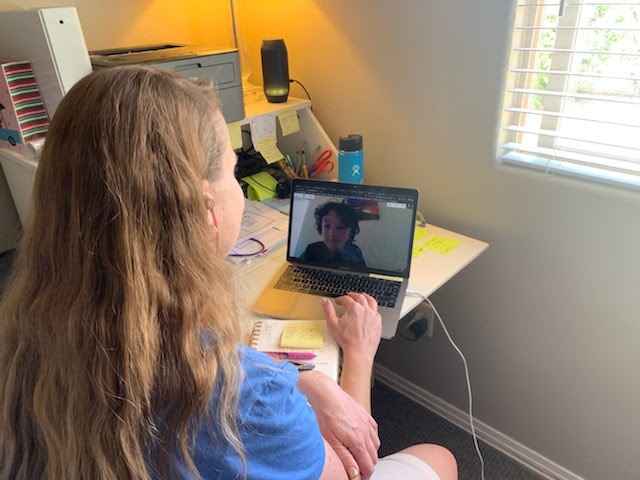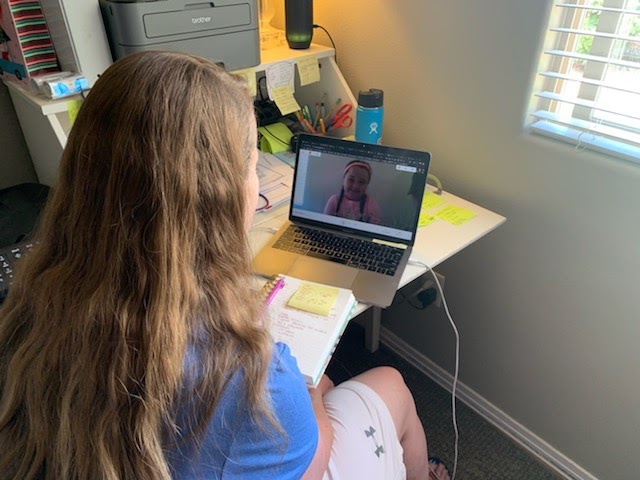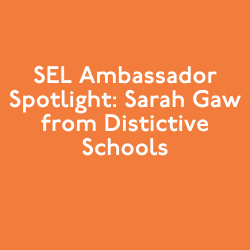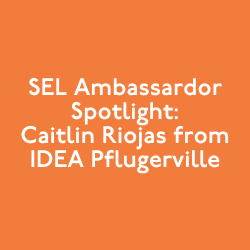Over the past 2 months, schools have shifted teaching and learning in a way they have never done before. From solving problems like access to devices and the internet, to innovating new ways to deliver content, track attendance, and engage parents, it feels like there have been more changes in the past 2 months than in the past 10 years!
Hear from some of our partner schools to learn more about how they have been facilitating social emotional learning remotely. We hope you gather some ideas to help support your school communities, too!
Michele D’Avignon is the School Counselor at Diamond Valley Elementary School in Utah. Her school has been using Move This World for 2 years and has shifted facilitation for remote learning over the past few weeks. We spoke with her to learn more about what SEL looks like at Diamond Valley Elementary School right now.
MTW: What does virtual learning look like in your school community right now?
Ms. D’Avignon: Our school took action to provide support to our students through the distribution of ChromeBooks and free access to internet services for low-income families. These services were in place the day our soft-closure was announced. We stay in contact with our families through text, email, and phone calls. A weekly notification is sent out on Mondays informing families of upcoming events, provided services, and general information. Our school district also sent out communication to families regarding school closures and procedures that would be implemented to ensure the transition was handled smoothly.
MTW: Your school is quite unique. Can you explain a bit about your programs and how they have been adapted to virtual learning?
Ms. D’Avignon: Teachers have worked diligently to provide meaningful instruction without overwhelming their students. Our school is unique because of the programs we offer. Diamond Valley is classified as a High Ability Learning school. We have students who perform at a higher level in Language Arts, Math, and Science. They are required to be tested to qualify to attend the school. If they qualify, they are invited to enroll. The instruction in the gifted and talented classes is designed at a more advanced level to encourage them to expand their knowledge in their specific learning areas. This program has been expanded to our lower grades where they are also enrolled in the Spanish dual-immersion classes. Not only are they learning curriculum at an advanced level, but it is incorporated with learning a second language.
Of course, the dual-immersion classes are provided for students who are not classified as HAL students. But the ability to provide multiple programs has encouraged more families to investigate our school. We have students who attend the school throughout the county because of these specialized areas of instruction.
We are also a STEAM school. This focus provides instruction in science, technology, engineering, art, and music. On Fridays, the staff designed lessons specifically for these designated areas. Students were allowed to sign-up for six week classes where they created projects related to one of five categories. This was an extension to the rest of the instruction given during the week.
All of these programs have been coordinated by our talented teachers who were able to include these activities in their instruction. They have been centered on providing instruction that incorporates these different curriculum streams. The dual-immersion teachers have been recording lessons in Spanish to encourage students to continue practicing the language. All of the teachers have been doing Google Hangout Meets at least once a week to keep students engaged in the learning process. Paraprofessionals have been conducting reading groups digitally through Hangout. Digital books have been made available through the Echo program. And paper packets have been made for pick-up at the school every Monday. Everyone has worked hard to make the lessons interesting and interactive.
Everything is available to the students through individual teacher Schoology accounts which are connected to the students’ PowerSchool tracking system. These programs work together to provide progress monitoring to families. And parents can communicate directly with teachers.
Auxiliary classes have also been provided on Schoology. Many parents requested additional areas of instruction for their children. Art, Music, Computer, Physical Education, and Counseling have been added to the Schoology site for students to explore and interact.

School counselor Ms. D’Avignon supports students virtually during school closures.
MTW: What does SEL look like in your school community right now?
Ms. D’Avignon: Currently, we are providing Social and Emotional Learning through teacher instruction and direct counseling services. The Move This World videos are available through the counselor’s website. And teachers have encouraged students to practice the different Emogers they have learned for the past two years. Students are able to recite the learned techniques through the social and emotional lessons taught during the year. Many of them have been using calming skills to manage their worries, concerns, and feelings during this time period.
MTW: How are families in your community coping during this time?
Ms. D’Avignon: It has been amazing to talk to students who have developed a “Wellness Room” in their house. There is a family I have been working with this year who suffers from severe anxiety. The soft-closure amplified their anxieties. Upon meeting with them through Google Hangout, I learned they developed spaces in their home where they can “take a break” if they feel their emotions are getting out of control. Since the children know the language of the Wellness Room, I have encouraged mom to use the same communication when she is feeling overwhelmed. She has told her kids that she needs to go to her “Wellness Center” for five minutes to help her get back to center. She asked me to relay this quote from her:
“…I appreciate the help you’ve given my kids during the school closure and how you’ve helped all of them (including myself ) cope better and come up with calming solutions that the kids have put into practice. Luke says, “I’m going to do what Mrs. D and I talked about doing.” And based on the feedback you gave me- I tell my kids I am going to my wellness center (my bedroom-to breathe) and it helps me from having my bigger breakdowns. So you have helped my family all around.” -Natalie S., Parent
MTW: How are you practicing SEL at home to support yourself and your family?
Ms. D’Avignon: I have found the best way for me to practice SEL at home is to go for a walk everyday. This helps me to regroup and come up with new ideas. It also gives me a break when I feel the stress is getting to be too much. Being outside in the sun while listening to music or talking to my daughter has helped me to be connected more to the world.
MTW: Besides transitioning to remote learning, how has your counseling practice changed to support families during this time?
Ms. D’Avignon: During my one-on-one counseling sessions I have invited parents to be involved. Yes, this goes outside ethical practices encouraged by ASCA guidelines, but I have felt it was important for parents to know what their child is struggling with. I had one session recently where a fourth-grade student, who has a hard time making friends, played a game where a wheel was spun and it landed on different aspects of what makes a good or a bad friend. Her mother was very surprised that she could come up with reasons why a certain trait, that was obviously a bad trait, could be justified as a good trait. She did not realize her daughter thought that way. It opened up a new understanding of why her daughter reacts a particular way in her relationships with others.

Meeting with students virtually allows school counselor Ms. D’Avignon the opportunity to connect with families, too.
MTW: Can you tell me more about the parent support group you are creating? Where did the idea come from? How are you getting it off the ground and how will parents participate?
Ms. D’Avignon: The parent support group was thought up by our teachers at the school. The idea was presented to me from my principal after he met with several of the grade level teams who all mentioned doing a group for parents. During my counseling sessions with students, I have had the opportunity to talk to several parents to help them with the added responsibility of keeping their children motivated. But my contact has been limited to students who I have worked with throughout the year. So I knew there was a need out there, but I did not have a complete picture of what they needed the most help with.
We sent out a parent survey this week to find out what topics parents were most concerned about. It also included days and times that would work best with their schedule. Our plan is to create a group once a week where a specific topic would be discussed along with questions, comments, and ideas that could be shared after the general session. Parents would use Google Hangout Meets to participate and the sessions are scheduled for a one hour block of time, regardless if we use the whole time or not. We will be encouraging parents to express their feelings and to get support from other parents to assist them through the process.
So far, the feedback has been very encouraging and exciting. Parents are interested in receiving help with the issues that have been plaguing them since the beginning of the soft-closure. The group should start next week.
MTW: What advice do you have for other schools that want to help families practice SEL at home right now?
Ms. D’Avignon: I think it is important to remember our students are reacting to the way the soft-closure is being treated at home. If parents are struggling, there is a good possibility the children are also struggling. We need to be cognizant of the family dynamic to be the most effective with students. Frustration can lead to bad decisions and those decisions can have negative effects on the children. No one planned for a soft-closure this year so it has become an adjustment to our daily lives. Giving advice and directing families to use SEL practices at home can help alleviate some of the issues related to the loss of resources. Encourage families to create breaks in their day where they can connect as a family. Help them to feel it is alright to take care of themselves first and work on things individually rather than all at once. Flexibility is key and feeling overwhelmed is normal. They need to learn how to self-regulate their emotions and control their frustrations. Providing ideas and techniques are vital to families during this unprecedented time.
Thank you, Ms. D’Avignon, for all that you are doing for your school community and for sharing such inspiring ideas with our community!
This time of school closures has brought unprecedented challenges for all of us, and schools have had to shift to remote learning very quickly. Our partner schools have navigated those challenges with SEL at the forefront of their work, and we hope their stories give you ideas about supporting SEL in your school community, too!
Are you ready to implement social emotional learning in your district or school? Share your information and we’ll be in touch!
[pardot-form id=”263″ title=”MTW General Interest Form”]










